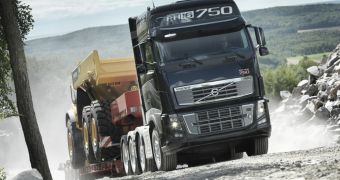The EU announced targets of reducing emissions of greenhouse gases from the transport sector by 20 percent between 2008 and 2030, as more freight needs to be carried. Surprisingly, the answer to this question appears to be larger and more powerful trucks.
As a solution to such a complex problem, the Swedes at Volvo Trucks have recently launched the Volvo FH16 with 750 hp, with the engine available in two versions, one for Euro 5 and the other for EEV (Enhanced Environmentally-friendly Vehicle).
For the last four decades, demands on more efficient transport have driven many developments in the direction of increasingly powerful trucks.
"What is remarkable is that during the same period, fuel consumption and climate impact have dropped by an average of about 40 percent, while emissions of nitrogen oxides and particles have been cut by more than 90 percent," stated Hayder Wokil, product manager at Volvo Trucks.
Volvo Trucks aims to further reduce fuel consumption and carbon dioxide emissions from its trucks. The company claims that one in every three semi-trailers on Europe's roads would no longer be needed if more countries in Europe would allow truck rigs of up to 25.25 metres in length.
"Longer and more powerful trucks are of course not the only solution to the transport sector's climate problems, but they are one of many answers. Here at Volvo Trucks we see it as our mission to pursue development and to make truck transport's environmental footprint as small as possible. Trends thus far show that a smaller climate impact and more efficient transport really do go hand in hand," added Wokil.
Production of the first Volvo FH16 trucks for the European market with the 750hp output is to kick off in early 2012. In addition to the 750 hp version, Volvo's 16-litre engine is available with power outputs of 540, 600 and 700 hp.

 14 DAY TRIAL //
14 DAY TRIAL //